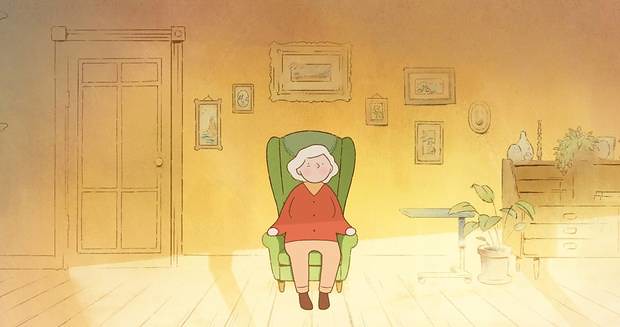(And the nominees are . . .)
This year, ten nominations each for
Roma and
The Favourite, both leading the pack -- I can live with that. Eight nominations for
Vice gets something more akin to "whatever" from me, but at least the Academy doesn't seem to be too far out of line with my thinking generally this year. Well, except for one particularly notable snub: no nominations whatsoever for
Eighth Grade, which just happens actually to be
the best film of 2018.
This is all subjective, of course, and we're all just passing time with this crap. But I've been doing it for years and years, and I'll never stop! Also, if a superhero movie must be the first ever to be nominated for Best Picture,
Black Panther is the one to do it. It won't win and it doesn't deserve to, but it sure as shit deserves a nomination; I was way of the possibility that it wouldn't.
There's actually a surprising number of nominees I haven't seen this year. A couple I've never even heard of. As usual of course I have seen the vast majority, so let's get into it.
Actor in a Leading Role
Christian Bale,
Vice
Bradley Cooper,
A Star Is Born
Willem Dafoe,
At Eternity's Gate
Rami Malek,
Bohemian Rhapsody
Viggo Mortensen,
Green Book
WHO I THINK WILL WIN: Many months ago, I would not have said this was a tough one -- it's toucher now, only because Bradley Cooper's momentum has waned. And this year, the SAG Awards have yet to happen, so making this prediction today is a lot trickier than it will be a week from now. That said, considering the competition, if pressed, I would still predict Bradley Cooper. If not him, at the moment, it looks like it's close to a toss-up between him and Christian Bale.
WHO I THINK SHOULD WIN: My vote since the moment I saw
A Star Is Born has never wavered from Bradley Cooper, whose transformation is astonishing -- honestly, even more so than Christian Bale's, even though it's not as flashy and attention-getting.
WHO I THINK SHOULD
NOT WIN: How have I not even heard of
At Eternity's Gate, let alone seen it? Perhaps it's unfair to declare a performance I have not even seen should not win, but this is a movie that has not in any way been in the national conversation. It simply makes the least sense for that one to win.
Actress in a Leading Role
Yalitza Aparicio,
Roma
Glenn Close,
The Wife
Olivia Colman,
The Favourite
Lady Gaga,
A Star Is Born
Melissa McCarthy,
Can You Ever Forgive Me?
WHO I THINK WILL WIN: I feel like this is the one race that nearly every year has the greatest competition, packed with great performances. Many people seem to think Glenn Close will win, largely because she has more nominations without a win than any other actor alive today, but it seems telling to me that
The Wife has no other nominations. So this really is a tough one. I'm leaning toward Melissa McCarthy, but I'm probably wrong.
WHO I THINK SHOULD WIN: And this may be sheer bias on my part -- because I actually feel Melissa McCarthy deserves the win.
WHO I THINK SHOULD
NOT WIN: I love Lady Gaga, but her performance in
A Star Is Born was fine -- not great. She should get the Oscar for Best Song.
Actor in a Supporting Role
Mahershala Ali,
Green Book
Adam Driver,
BlacKkKlansman
Sam Elliott,
A Star Is Born
Richard E. Grant,
Can You Ever Forgive Me?
Sam Rockwell,
Vice
WHO I THINK WILL WIN: Given the sheer number of nominations for
Vice, the unlikelihood of all others in this category, and his legitimately incredible performance as George W. Bush, I think Sam Rockwell has the edge here.
WHO I THINK SHOULD WIN: Upon further reflection, among these five, I think Sam Rockwell gets my vote as well.
WHO I THINK SHOULD
NOT WIN: I actively avoided seeing
Green Book, as its production has been uncomfortably problematic in far too many ways: its
cliched white perspective without bothering to get the story
from the family of the black man it was based on; its writer's own
bigoted comments (directly aligning himself with Donald Trump, no less); its
portrayal of a gay man, just to name a few. Mahershala Ali is a great actor who has done great work -- he deservedly won an Oscar for
Moonlight only two years ago -- but even without having seen this movie, I feel I know enough to conclude this is not a particular film that needs to be rewarded.
Actress in a Supporting Role
Amy Adams,
Vice
Marina de Tavira,
Roma
Regina King,
If Beale Street Could Talk
Emma Stone,
The Favourite
Rachel Weisz,
The Favourite
WHO I THINK WILL WIN: I have no idea! I'd want to give
The Favourite the edge, except that it has two nominees in this category, which could split the vote. This is now Amy Adams's sixth nomination with no win, which could give it to her.
WHO I THINK SHOULD WIN: I'm leaning toward Rachel Weisz here, but . . .
WHO I THINK SHOULD
NOT WIN: . . . I'd be fine with anyone in this category winning, really. Marina de Tavira's nomination was a genuine surprise; I'm not sure anyone was predicting acting nominations for
Roma besides Yalitza Aparicio as the lead. And really, all five of these women are great. That said -- well, Emma Stone
did win for
La La Land only two years ago. She doesn't need to win for this. (Rachel Weisz also already has an Oscar, but it's been longer since she last won, in 2006, for
The Constant Gardener.)
Animated Feature Film
Incredibles 2
Isle of Dogs
Mirai
Ralph Breaks the Internet
Spider-Man: Into the Spider-Verse
WHO I THINK WILL WIN: I feel like this is a close call between
Isle of Dogs and
Spider-Man: Into the Spider-Verse. If critical response has any sway at all, it'll likely go to the latter.
WHO I THINK SHOULD WIN: Much as I did genuinely love
Incredibles 2, for once I am
not rooting for the Pixar film.
Spider-Man is where it's at -- and I say this as someone who avoids superhero movies as a rule! This one is exceptional in far more ways than any of the others, though: the story, the animation, the themes, everything.
WHO I THINK SHOULD
NOT WIN: I don't know,
Mirai, I guess? This answer is completely unfair since it's the one nominee I did not see. But, I hate anime. And
Spider-Man deserves it, god damn it!
Cinematography
Cold War, Łukasz Żal
The Favourite, Robbie Ryan
Never Look Away, Caleb Deschanel
Roma, Alfonso Cuarón
A Star Is Born, Matthew Libatique
WHO I THINK WILL WIN: I'll bet my head on a spike that
Roma will win this award.
WHO I THINK SHOULD WIN:
Roma for the win! Not enough people saw this movie, but probably enough members of the Academy did. And, true to form for Alfonso Cuarón movies, the cinematography is jaw-dropping.
WHO I THINK SHOULD
NOT WIN: I truly loved virtually everything else about
The Favourite, but the one thing I
disliked about it was its fishbowl-lens cinematography, which I found persistently distracting. I could only get past it after seeing it three times. Even though I am clearly in the minority on this point, cinematography would be the single award I think that movie does not deserve.
Production Design
Black Panther
The Favourite
First Man
Mary Poppins Returns
Roma
WHO I THINK WILL WIN: This is always a hard one to predict. Maybe
The Favourite will get this one, since the production design detail of
Roma -- which is itself intricate and extensive -- gets a little lost in the black and white cinematography. And
The Favourite was shot in opulent, vast palaces that really added to the tone of the story.
WHO I THINK SHOULD WIN: I think I just convinced myself
The Favourite should win.
WHO I THINK SHOULD
NOT WIN:
Mary Poppins Returns was fun, but ... come on.
Costume Design
The Ballad of Buster Scruggs, Mary Zophres
Black Panther, Ruth Carter
The Favourite, Sandy Powell
Mary Poppins Returns, Sandy Powell
Mary, Queen of Scots, Alexandra Byrne
WHO I THINK WILL WIN: I think I'm going to declare
The Favourite as having the edge here as well. It's possible
Mary, Queen of Scots actually deserves it, but only two nominations, that movie isn't likely to win anything.
WHO I THINK SHOULD WIN: I actually think
Black Panther also has a legitimately decent chance in this category, and you know what? If
Black Panther wins any Oscar at all, it should be for its intricately African-inspired costume designs.
WHO I THINK SHOULD
NOT WIN: Seeing three nominations for
The Ballad of Buster Scruggs is a little jarring; I did not expect it to get any, in spite of knowing it did get a
very limited theatrical release just to qualify -- thereafter, though, it seemed merely to be a Netflix original streaming movie. Who ever expects Oscar nominations for such things? The times, they are a-changin'. It doesn't deserve this award, regardless. I mean, the cowboy outfits are nice and all, but they're still just cowboy outfits.
Directing
Spike Lee,
BlacKkKlansman
Pawel Pawlikowski,
Cold War
Yargos Lanthimos,
The Favourite
Alfonso Cuarón,
Roma
Adam McKay,
Vice
WHO I THINK WILL WIN: Conventional wisdom already says this will be another year with a split between Best Director and Best Picture, and in this category more than any other, Alfonso Cuarón is the one to beat. I was surprised to see a
second foreign language film in this category (
Cold War), but for that one, the nomination itself is the award.
WHO I THINK SHOULD WIN: Honestly? For every film here
except for
Roma, I feel that had they not been nominated for Best Director, that would have been fair. Only a
Roma exclusion would have been a stunning snub.
Roma is the only truly deserving winner here.
WHO I THINK SHOULD
NOT WIN: I'm going with Adam McKay and
Vice. I'm most surprised by his even being included here -- what is with the love for that movie, anyway? It's all right, but also fails to justify its own existence beyond acting parlor tricks. Christian Bale as Dick Cheney is impressive, and also it's not fun to watch the story of Dick Cheney.
Film Editing
BlacKkKlansman, Barry Alexander Brown
Bohemian Rhapsody, John Ottman
The Favourite, Yargos Lanthimos
Green Book, Patrick J. Don Vito
Vice, Hank Corwin
WHO I THINK WILL WIN: Hey, what!
Roma isn't even nominated here. That's odd. I do think movies being in any way polarizing hurts its chances, even for a lower-tier award like Editing. And you know which is the
only one of these films that is not notably polarizing in any way?
The Favourite.
WHO I THINK SHOULD WIN:
The Favourite also gets my vote.
WHO I THINK SHOULD
NOT WIN:
Green Book. Don't give that whitewashing movie any awards!
Foreign Film
Capernaum, Lebanon
Cold War, Poland
Never Look Away, Germany
Roma, Mexico
Shoplifters, Japan
WHO I THINK WILL WIN: I am actually including this category for the first time in roughly a decade this year, because for once I have actually seen most of them! Well, two out of three. I haven't even had a chance to see
Capernaum yet, even though it's opening locally soon; also, what the hell is
Never Look Away? Hmm, apparently a three-hour German romance about a tortured soul. Whatever,
Roma is winning this award. Unless . . .
WHO I THINK SHOULD WIN: What are the odds that
Roma wins both Best Picture and Best Foreign Film? Pretty much zilch, I would think -- and, in the absence of
Eighth Grade, among the nominees,
Roma truly deserves to win Best Picture. And if that should happen?
Cold War should win Best Foreign Language Film. It actually is very good.
WHO I THINK SHOULD
NOT WIN: Honestly I could not see what the big deal was with
Shoplifters. It was fine, but hardly Oscar-worthy.
Makeup and Hairstyling
Border
Mary, Queen of Scots
Vice
WHO I THINK WILL WIN:
Border? What the hell is that? -- oh, right, I nearly forgot: this actually did play locally and I never went to see it. Its main characters are borderline disfigured, hence the makeup nomination. It was a very small, Swedish movie that got almost no attention outside critic circles. Therefore, given the massive transformations of both Christian Bale and Sam Rockwell,
Vice is sure to win this one.
WHO I THINK SHOULD WIN: Much as I hesitate to throw any awards at
Vice, it probably does deserve this one. Maybe
Border does too, but I skipped that one.
WHO I THINK SHOULD
NOT WIN:
Mary, Queen of Scots seems too on the nose for this award these days, to be honest. Both the other nominees clearly deserve it more.
Music (Original Score)
Black Panther, Ludwig Goransson
BlacKkKlansman, Terence Blanchard
If Beale Street Could Talk, Nicholas Britell
Isle of Dogs, Alexandre Desplat
Mary Poppins Returns, Marc Shaiman
WHO I THINK WILL WIN: I bet anything this one will go to
Black Panther, which is packed with nuanced, meaningful details in all sorts of its production elements -- not least of which is its score.
WHO I THINK SHOULD WIN:
Black Panther should get it. I'd be fine with
If Beale Street Could Talk winning, but there is no question
Black Panther had the greater reach, and deservedly so.
WHO I THINK SHOULD
NOT WIN: I won't go so far as to say any of these movies is patently
undeserving, but I will say
Mary Poppins Returns is least likely to get it, and that's fine.
Music (Original Song)
"
All the Stars," from
Black Panther, Music by Mark Spears, Kendrick Lamar Duckworth and Anthony Tiffith; Lyric by Kendrick Lamar Duckworth, Anthony Tiffith and Solana Rowe
"
I'll Fight," from
RBG, Music and Lyric by Diane Warren
"
The Place Where Lost Things Go," from
Mary Poppins Returns, Music by Marc Shaiman; Lyric by Scott Wittman and Marc Shaiman
"
Shallow," from
A Star Is Born, Music and Lyric by Lady Gaga, Mark Ronson, Anthony Rossomando and Andrew Wyatt
"
When A Cowboy Trades His Spurs For Wings," from
The Ballad of Buster Scruggs, Music and Lyric by David Rawlings and Gillian Welch
WHO I THINK WILL WIN: If "Shallow" from
A Star Is Born does not win this award, I will saw off my left arm.
WHO I THINK SHOULD WIN: Given its context in a great movie with great music about musicians, "Shallow" also deserves to win this.
WHO I THINK SHOULD
NOT WIN: So I went online to refresh my memory of "What a Cowboy Trades His Spurs For Wings," and . . . no.
Visual Effects
Avengers: Infinity War
Christopher Robin
First Man
Ready Player One
Solo: A Star Wars Story
WHO I THINK WILL WIN: This one's hard.
First Man is the only one of these movies for which I gave a solid A grade to its special effects, but that movie has so few nominations, who knows? And most of the others were much bigger blockbusters and therefore seen by many more people. I'm going to call this one for
Avengers: Infinity War, which, at the very least, had far better effects than the dismal
Avengers: Age of Ultron.
WHO I THINK SHOULD WIN:
First Man is without question the most impressive movie among these, in terms of its visual effects.
WHO I THINK SHOULD
NOT WIN:
Ready Player One can fuck right off with its visual effects that were average at best. Why is it even nominated? Just
having countless effects shots should not be considered a qualification!
Writing (Adapted Screenplay)
The Ballad of Buster Scruggs, Written by Joel Coen & Ethan Coen
BlacKkKlansman, Written by Charlie Wachtel & David Rabinowitz and Kevin Willmott & Spike Lee
Can You Ever Forgive Me?, Screenplay by Nicole Holofcener and Jeff Whitty
If Beale Street Could Talk, Written for the screen by Barry Jenkins
A Star Is Born, Screenplay by Eric Roth and Bradley Cooper & Will Fetters
WHO I THINK WILL WIN: This award often goes to movies with no chance of winning other awards. Does that narrow it down? By that metric, at least after disqualifying
The Ballad of Buster Scruggs for its unusually brief theatrical run, I suppose the award will go to
Can You Ever Forgive Me?
WHO I THINK SHOULD WIN: I'm going for
Can You Ever Forgive Me? here, but would also be perfectly happy with
A Star Is Born, whose script spoke to me and made me feel seen in totally unexpected ways.
WHO I THINK SHOULD
NOT WIN:
The Ballad of Buster Scruggs's six chapters are far too all over the place to be deserving of this award.
Writing (Original Screenplay)
The Favourite, Written by Deborah Davis and Tony McNamara
First Reformed, Written by Paul Schrader
Green Book, Written by Nick Vallelonga, Brian Currie, Peter Farrelly
Roma, Written Alfonso Cuarón
Vice, Written by Adam McKay
WHO I THINK WILL WIN: This one comes down to
Roma and
The Favorite, and considering the belabored pacing of the former, I think the latter actually has the edge in this category.
WHO I THINK SHOULD WIN: Much as I really want to reward
The Favourite here, upon further reflection,
Roma may actually be the most deserving. Its script is far and away the most nuanced of these five.
WHO I THINK SHOULD
NOT WIN: Oh have I mentioned, "fuck
Green Book"?
Best motion picture of the year
Black Panther
BlacKkKlansman
Bohemian Rhapsody
The Favourite
Green Book
Roma
A Star Is Born
Vice
WHO I THINK WILL WIN: This is so hard to say, because a foreign film has never won this award before. I'll be happy to be wrong, but the alternative being
A Star Is Born, I still think that's the most likely winner, and I'd be happy with that as well. It really spoke to me personally in pleasantly surprising ways.
WHO I THINK SHOULD WIN: My #1 movie of the year (
Eighth Grade) and my #2 movie (
Blindspotting) both criminally received zero nominations -- but, my #3 movie was
Roma, and that one received ten. Being forced to choose between these eight movies,
Roma is the only choice to make here.
WHO I THINK SHOULD
NOT WIN: Hello,
Green Book! That movie winning this year would be the most tone deaf thing the Academy has done since
Crash won Best Picture over
Brokeback Mountain in 2006. Lucky for everyone alive, there's no chance whatsoever that movie will win this award this year.
(Nominations for documentary feature, documentary short, animated short, live action short, sound editing, and sound mixing were also announced, but I don't know enough about them to make any worthwhile observations.)
The 91st Academy Awards telecast will air on ABC Sunday, February 24 at 5 p.m. Pacific Time. .
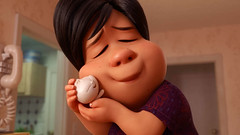 This year's set of animated shorts, better than average but falling short of particular greatness as always, starts with the one short many of us already saw, as it was presented last year prior to screenings of Pixar's Incredibles 2. It's an 8-minute short called Bao, American and about an Asian mother's evolving relationship with her son -- as represented by a dumpling. I think. Honestly this one went, at least in part, kind of over my head, although the animation is up to typical standards of Pixar excellence and still has charm to spare. Who knew a dumpling could be so adorable?
This year's set of animated shorts, better than average but falling short of particular greatness as always, starts with the one short many of us already saw, as it was presented last year prior to screenings of Pixar's Incredibles 2. It's an 8-minute short called Bao, American and about an Asian mother's evolving relationship with her son -- as represented by a dumpling. I think. Honestly this one went, at least in part, kind of over my head, although the animation is up to typical standards of Pixar excellence and still has charm to spare. Who knew a dumpling could be so adorable?
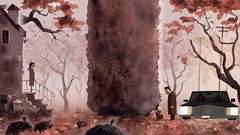 The longest of this year's animated crop is the 15-minute Weekends, an American short detailing a young boy as he grows accustomed to visiting his father on weekends shortly after his parents' separation. Eventually each parent finds a new romantic partner, with varying results of which the child has limited understanding. The water color animation is very pretty, but the length of the story exceeds necessity.
The longest of this year's animated crop is the 15-minute Weekends, an American short detailing a young boy as he grows accustomed to visiting his father on weekends shortly after his parents' separation. Eventually each parent finds a new romantic partner, with varying results of which the child has limited understanding. The water color animation is very pretty, but the length of the story exceeds necessity.
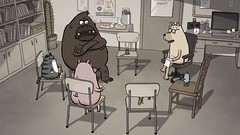 I really wanted to love Animal Behaviour, the 14-minute short from Canada about several different animals in a group therapy session, as it's the kind of thing that's right up my alley. What's not to love about a group of characters so diverse it includes not only a dog, a cat and pig, but also a bird, a gorilla, a praying mantis and a leech? And they all have their own mental issues -- I just wish those issues had been explored with a little more cleverness. This one seems to coast a bit on its concept alone, although I will admit it still got a few good chuckles out of me.
I really wanted to love Animal Behaviour, the 14-minute short from Canada about several different animals in a group therapy session, as it's the kind of thing that's right up my alley. What's not to love about a group of characters so diverse it includes not only a dog, a cat and pig, but also a bird, a gorilla, a praying mantis and a leech? And they all have their own mental issues -- I just wish those issues had been explored with a little more cleverness. This one seems to coast a bit on its concept alone, although I will admit it still got a few good chuckles out of me.
 One Small Step is the one animated short nominee with two countries of origin: USA & China. This 8-minute short details the astronautical ambitions of a girl as she grows up struggling through school, at the expense of noticing the attentions and assistance of her cobbler father. He regularly mends her shoes, she regularly fails to notice until she has finally reached her goals and then it is too late. This one also has excellent animation, which is somewhat ironic given how little of the story calls for it as a necessity (as opposed to shooting it as live action). Honestly, the most deeply affecting moment is the clip during the end credits, with one of the directors so excited to hear his short was nominated he starts crying. Three of the nominated shorts feature clips of this sort at their end, it's always a nice thing to see.
One Small Step is the one animated short nominee with two countries of origin: USA & China. This 8-minute short details the astronautical ambitions of a girl as she grows up struggling through school, at the expense of noticing the attentions and assistance of her cobbler father. He regularly mends her shoes, she regularly fails to notice until she has finally reached her goals and then it is too late. This one also has excellent animation, which is somewhat ironic given how little of the story calls for it as a necessity (as opposed to shooting it as live action). Honestly, the most deeply affecting moment is the clip during the end credits, with one of the directors so excited to hear his short was nominated he starts crying. Three of the nominated shorts feature clips of this sort at their end, it's always a nice thing to see.
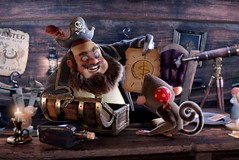 Often these presentations feature five nominees of such short average length that several "Highly Commended" extras get tacked onto the end. This year there are only two, the first being Wishing Box, a 6-minute American short with impressively crisp animation and slightly lacking in substance. I pirate discovers his monkey can pull anything it wishes for out of an otherwise empty box, much of it fruit it wants to eat. Once the pirate's greediness gets the monkey on board (so to speak) with wishing for riches, a fairly predictable lesson is learned.
Often these presentations feature five nominees of such short average length that several "Highly Commended" extras get tacked onto the end. This year there are only two, the first being Wishing Box, a 6-minute American short with impressively crisp animation and slightly lacking in substance. I pirate discovers his monkey can pull anything it wishes for out of an otherwise empty box, much of it fruit it wants to eat. Once the pirate's greediness gets the monkey on board (so to speak) with wishing for riches, a fairly predictable lesson is learned.
 Tweet Tweet, a short from Russia, is arguably among the most intriguing of all the shorts here, and I would submit that it was more deserving of a nomination than, say, Animal Behaviour. Being intriguing does not mean it necessarily makes sense, however: the entirety of its run time features human feet on a tightrope that runs across the screen, along with a bird. There are clearly profound metaphors intended here, though I couldn't tell you what they are. The animation is excellent, though, and a lot of thoughts about both Russian history and of life and aging is packed into its twelve minutes.
Tweet Tweet, a short from Russia, is arguably among the most intriguing of all the shorts here, and I would submit that it was more deserving of a nomination than, say, Animal Behaviour. Being intriguing does not mean it necessarily makes sense, however: the entirety of its run time features human feet on a tightrope that runs across the screen, along with a bird. There are clearly profound metaphors intended here, though I couldn't tell you what they are. The animation is excellent, though, and a lot of thoughts about both Russian history and of life and aging is packed into its twelve minutes.
